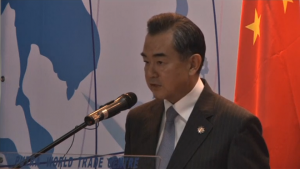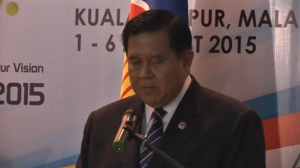 AUGUST 6 (Reuters) — China and the Association of Southeast Asian Nations (ASEAN) agreed on Wednesday (August 5) to speed up consultations on a Code of Conduct (CoC) for the disputed South China Sea, the foreign ministers of China and ASEAN member Thailand said.
AUGUST 6 (Reuters) — China and the Association of Southeast Asian Nations (ASEAN) agreed on Wednesday (August 5) to speed up consultations on a Code of Conduct (CoC) for the disputed South China Sea, the foreign ministers of China and ASEAN member Thailand said.
“The ASEAN nations promise to a full implementation of DoC (Declaration on Conduct) and speed up the discussion on CoC (Code of Conduct). And we’ll discuss about the risk management and control on the sea,” said Wang Yi after a nearly two-hour meeting with China’s dialogue partner from ASEAN.
Wang Yi also told the joint news conference with Thai Foreign Minister General Tanasak Patimapragorn that non-regional countries should refrain from actions that might escalate or complicate the situation in the sea.
“We want to send a message to the world, that is: China and ASEAN are capable and brilliant enough to resolve the problem that we face. China and ASEAN has a bright future in cooperation, we’re confident about that,” said Wang.
China claims most of the South China Sea, through which $5 trillion in ship-borne trade passes every year. The Philippines, Vietnam, Malaysia, Taiwan and Brunei have overlapping claims.
The ASEAN members involved in the claims wanted to discuss the matter collectively but was rejected by China.
With China’s promise it raised hopes among the regional bloc to an early conclusion on CoC. 
“ASEAN and China have agreed upon the Second List of Commonalities. Both sides have now agreed to enter a ‘new phase’ of consultations on the CoC which would include discussions of a structure for the CoC as well as other areas of cooperation. This would pave the way for the early conclusion of the CoC,” said Tanasak.
Recent satellite images show China has almost finished building a 3,000-metre-long (10,000-foot) airstrip on one of its seven new islands in the Spratlys.
The airstrip will be long enough to accommodate most Chinese military aircraft, security experts have said, giving Beijing greater reach into the heart of maritime Southeast Asia.







